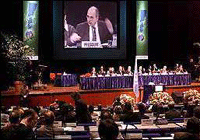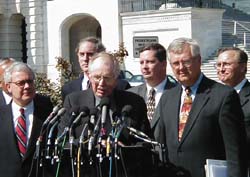Culture Change
e-Letter #96
Congress hears
quote by Jan Lundberg on peak oil
Goodbye American Dreamland
The meaning of peak oil is beginning to be explored in The People's House,
a.k.a. the U.S. House of Representatives in Washington, D.C. One Congressman,
Roscoe Bartlett, a Republican of Maryland, has followed the issues of oil supply
for many years and has begun to wake people up in the nation's capital and for the national
C-SPAN cable television audience.
The phrase "peak oil" is short for the global peaking of oil extraction, whereby supply only tightens.
This column has repeatedly anticipated the
economic effects and the role of the market in suddenly exacerbating the geological shortage at hand.
 On May 12, the Congressman spoke for one hour before the House in a
"Special Order speech," routinely featured at end of business for either party's representative to speak his or her mind following the "leadership hour." He recited a passage from one of my syndicated Culture Change Letter reports, "Peak Oil in a Nutshell - Here Comes the Nutcracker." He
prefaced it by saying "You all have heard of the Lundberg Survey, well this is what Jan Lundberg wrote:"
On May 12, the Congressman spoke for one hour before the House in a
"Special Order speech," routinely featured at end of business for either party's representative to speak his or her mind following the "leadership hour." He recited a passage from one of my syndicated Culture Change Letter reports, "Peak Oil in a Nutshell - Here Comes the Nutcracker." He
prefaced it by saying "You all have heard of the Lundberg Survey, well this is what Jan Lundberg wrote:"
"The trucks will no longer pull into Wal-Mart. Or Safeway or other food
stores. The freighters bringing packaged techno-toys and whatnot from China will have no fuel. There will be fuel in many places, but hoarding
and uncertainty will trigger outages, violence and chaos. For only a short time will the police and military be able to maintain order, if at
all."
He then added his own warning: "You can imagine what might happen when the
lights go out. The veneer of civilization is very thin." Congressman Bartlett obtained my quote from Matt Savinar's website which got it from
Energy Bulletin which got it from BlueGreenEarth.com.
A definite trend is afoot. What we can call The Convergence of America is just ahead.
It will not be as in the past, but more in spirit as we grapple with the loss of petroleum and the end of economic growth.
Rather than as a nationalistic single entity, we will come together in the knowledge that
our separate and equal, diverse bioregions are our real homelands.
In my long career of concern over oil pollution -- from my days of serving the oil industry, to fighting it, to predicting the imminent end of
abundant supply -- I have never been as exhilarated as now to think that a change is in the wind. I have previously testified before Congress as an
oil marketing expert, and I later enjoyed audiences of millions on many occasions even when my message was radically beyond mainstream news-media
priorities. Now, we are witnessing an awakening of the role of oil as a dwindling substance responsible for technological miracles, energy
gluttony and strategic/military pursuits. Everyone's differences will have to be put aside as we are starting to enter a new age.
On May 19th I told the Congressman about myself, in a long conversation in which he explained he is a "very conservative
Republican." I told him I
was about to release a column titled "Goodbye American Dreamland," knowing he could appreciate the concept. I asked Congressman Bartlett, "Is there
any chance you can tell President Bush about peak oil?" He replied "I have a half hour scheduled to do so, but I'm bringing two colleagues with
me so he doesn't think I'm just one nut." I told the Congressman that I wanted to work with him on peak oil, and he asked me
if I ever get to Washington, DC.
 He mentioned he was not going to let Rumsfeld pressure him to vote for CAFTA, which I agreed is an energy-intensive prospect like Plan Puebla
Panama. I did not question why a Secretary of Defense is so interested in a free trade agreement. At any rate, Congressman Bartlett reminded me that the U.S. military is the biggest consumer
of oil. I remarked that people can now find common ground on oil issues, for example on national energy security: I said I had as a peacenik opposed the Gulf War and called for no more road building in order to stop extending the nation's oil supply lines, as the war had to do with energy security. The Congressman stated that trains are the best way to transport people and save energy, partly because the rail bed is easier to maintain than roads. I told him of my history of road-fighting environmentalism.
He mentioned he was not going to let Rumsfeld pressure him to vote for CAFTA, which I agreed is an energy-intensive prospect like Plan Puebla
Panama. I did not question why a Secretary of Defense is so interested in a free trade agreement. At any rate, Congressman Bartlett reminded me that the U.S. military is the biggest consumer
of oil. I remarked that people can now find common ground on oil issues, for example on national energy security: I said I had as a peacenik opposed the Gulf War and called for no more road building in order to stop extending the nation's oil supply lines, as the war had to do with energy security. The Congressman stated that trains are the best way to transport people and save energy, partly because the rail bed is easier to maintain than roads. I told him of my history of road-fighting environmentalism.
We lamented AMTRAK's budgetary neglect, and I compared the annual subsidy to roads and oil as approaching the Pentagon's annual budget. I informed
him that oil prices today are so subsidized that people have no idea how much they are really paying for oil because the price is built in to so
many products and services.
I recommended to him the book Beyond Oil: The Threat to Food and Fuel in
the Coming Decades. He said he does not see how a population size of six and a half billion people can be maintained when the petroleum crash
hits. To address the food security situation and involve people with the oil reality I told him about "citizen petroleum councils," my idea that
found support at The Institute of Petroleum (now The Energy Institute) in
London.
I told him our various labels (Republican, Democrat, liberal, conservative) are outmoded and can be dispensed with because we'll all
have to come together. He asked me what should people be told about dealing with the oil crash. Besides minimizing petroleum dependence in
general, I suggested getting plastic out of their diets. I informed him of the toxic oil spill known as plastics that has yet to hit people's
consciousness. In hearing something such as this, it seems to me that Congressman Bartlett has opened the door of perception on a number of
issues and viewpoints, by looking critically and honestly at oil.
 "Congressman, you are making history." I could almost hear him blush over the telephone, as said he had recently gotten two Congressmen on board to
raise awareness on peak oil. He said he advocates a change in culture, but was not aware of the name Culture Change. He sees no
measure of success in owning many cars. We also agreed that the loss of oil -- for
unending economic expansion and for the coveted affluence that derived from cheap oil -- is an earth-shaking development in human history.
"Congressman, you are making history." I could almost hear him blush over the telephone, as said he had recently gotten two Congressmen on board to
raise awareness on peak oil. He said he advocates a change in culture, but was not aware of the name Culture Change. He sees no
measure of success in owning many cars. We also agreed that the loss of oil -- for
unending economic expansion and for the coveted affluence that derived from cheap oil -- is an earth-shaking development in human history.
Since peak oil gained extra currency starting in 2003 with the publishing of The Party's
Over, by Richard Heinberg, a steady stream of books, magazine articles and websites have examined the implications of peak oil,
while a few have also looked for solutions such as "relocalization" (Post Carbon Institute). A rapidly changing world requires swift adjustment for
those who would survive. It is time for honesty and realism, instead of blind hope that allows putting off severe conservation and avoiding
community cooperation heretofore unheard of.
Congressman Bartlett knows there is no magical solution around the corner that will allow us to remain in a dreamland of continuing consumption of
nonrenewable resources. He also knows that natural gas, as a form of petroleum, is saddled with the same supply outlook, roughly, as oil in a
global sense. Moreover, Roscoe Bartlett advocates changes deeper than energy policy: "We need to have a culture which has entirely new goals...we have to have a culture where success is not measured by how much energy
you consume. Success ought to measured by how little energy you can consume and still be very comfortable."
Because my statement that he read to the House and on cable television was limited to my encapsulating the short-term economic effects of the oil
crash that awaits peak oil, I wish to add to it before Congress to put my remarks of last week in context. I have been on C-SPAN before, but I have
fine tuned my message since telling the nation's energy reporters in 1990 that there was an environmentally sound alternative to war for oil.
My Testimony for Congress
I would start by reading the full context of the passage that Congressman
Bartlett utilized (from "Peak Oil in a Nutshell - Here Comes the Nutcracker," Culture Change Letter # 88):
The scenario I foresee is that market-based panic will, within a few days,
drive prices up skyward. And as supplies can no longer slake daily world demand of over 80 million barrels a day, the market will become paralyzed
at prices too high for the wheels of commerce and even daily living in "advanced" societies. There may be an event that appears to trigger this
final energy crash, but the overall cause will be the huge consumption on a finite
planet
The trucks will no longer pull into Wal-Mart. Or Safeway or other food stores. The freighters bringing packaged techno-toys and whatnot from
China will have no fuel. There will be fuel in many places, but hoarding and uncertainty will trigger outages, violence and chaos. For only a
short time will the police and military be able to maintain order, if at all. The damage that several days' oil shortage and outage will do will
soon wreak permanent damage that starts with companies and consumers not paying their bills and not going to work.
After an almost instant depression seizes the modern industrialized world, and nation-states break down, the frantic attempts of people to feed
themselves, stay warm and obtain fresh water (pumped presently via petroleum to a great extent), there will be no rescue. Die-off begins.
The least petroleum-dependent communities will survive best. These "backward" nations will be emulated by the scrounging survivors of the
U.S. and the rest of the "developed" world, as far as local food production will be tried -- in a paved-over, toxic landscape by people who
have lost touch with the land
What about renewable energy and other alternatives? They are not ready and will never be as long as oil is king. This is something not
acknowledged by the boosters of the technofix. When oil abdicates, no one can fill the shoes. (See Culture Change Letters on the Technofix such as
# 77.)
However, there will be replacement societies, starting with bands, tribes and rural communities that will start cooperating amongst themselves as
never before. The Age of Bioregional Countries, based on cooperation and mutual aid will begin. A main job-category will be restoration of the
land so as to provide a semblance of the diversity of food that Earth provided prior to petroleum
farming. Social structures will no longer lend themselves to overcrowded workforces dependent on the dollar to buy
goods and services from huge, distant and unaccountable corporations. Argentina may be a guide to post collapse society, with its egalitarian
and worker/citizen controlled systems.
I would expand on these ideas and claims in order to anticipate objections
and resistance from members of Congress and the media. They and much of the public cling to the assumption that technological progress will rescue
the economy and fall into place as easy as Detroit's offering new models of cars every year. The American Dream of having a "nice car" and owning
our own homes, awaiting a comfortable retirement, is about to burst.
Consumer society and its agents -- Madison Avenue, Hollywood, public
schools -- have lulled us into being passive citizens expected to feel so fortunate to choose at the ballot box one or another corporate
cheerleader of the status quo.
The underlying problem for the Waste Economy -- the system of profligate use of energy and disposable junk -- is overpopulation. The U.S. has over
296 million people, which along with a growth rate faster than any industrialized nation, is bad news for the biosphere. Well over three
quarters of the growth is from immigration and immigrants' higher birth rates. Half of immigration is legal due to Congress's approving high
quotas to suit the corporations' agenda. Doubling time for the U.S. population, at today's growth rate of 1.1% annually, is just over 60
years.
If the nation's people were not so dependent on petroleum, if the corporations weren't dependent on never-ending growth for a healthy bottom
line, and pollution were generated by only a population one tenth the size of today, we could straighten out the mess by taking a new direction. Now
we must face a tsunami of change, as our options come down to either survival or ecocide. It is clear that today's political affiliations are
not key, and must take a back seat.
It is most refreshing to find there is a member of Congress who is on a mission to wake people up about peak oil. Our job is barely beginning.
It is time for people to put aside their differences and start to educate one another and take steps. The nation is intact now, so any different
political set up is unthinkable to most people. However, a future that features local self-reliance offers the most logical solution to
impossible petroleum reliance. As Roscoe Bartlett says, "The average food on your plate travels 1,500 miles. Everything that you touch, if you’ve
got it, a truck brought it... We live in a plastic world; the herbicides for our crops; the fertilizer for our crops; the herbicides made from oil,
the nitrogen fertilizer made from natural gas. Every calorie of food you eat if you’re in this country -- it’s not quite that way in other parts of
the world -- represents about 10 calories of input from fossil fuel, from oil mainly."
Four years ago he gave an interview on the Kyoto
Protocol and was asked, "What would you ask for in an effective energy
policy for America?" Answer: "Well, for America, well I think we
need to have a focus on conservation. I think we need to have a focus on
efficiency and I think that we need to have a major focus on renewable sources
of energy so that we are not so dependant on foreign oil. Now we get
fifty-six, fifty-seven percent of our oil from overseas. That`s up from
thirty-four percent at the time of the Arab oil embargo." [Dr. Sallie
Baliunas, for Tech Central Station]
There is much to be said to a Congress that approved drilling the Arctic
National Wildlife Refuge, invading Iraq, and passes huge budgets for more
roads. The news media are loathe to offer up a spokesperson for the fringe
who offends corporate sponsors of news programs. But the fringe is on the
rise, and the message is actually all-inclusive and embraces humanity -- if only
people can rouse themselves from the deceptive, destructive dream before a most
rude awakening.
We
must seize and create opportunities to connect people across the land to
creative solutions and grassroots organizations.
- JL
May 20, 2005 Berkeley, California
*****
Read the full report
"Peak Oil in a Nutshell - Here Comes the Nutcracker" by Jan
Lundberg, at
http://culturechange.org/e-letter-peakoil.html
and check out Ten Basic Oil Supply Points at
http://culturechange.org/e-letter-oilsupply.html
Read Congressman
Bartlett's interview on Global Public Media (or listen) at
http://globalpublicmedia.org/transcripts/402
See his speech and
graphic presentation before Congress dated April 29, 2005:
http://www.bartlett.house.gov/SupportingFiles/documents/energyspeech.pdf
Post Carbon Institute: www.postcarbon.org
Matt Savinar's website: http://www.lifeaftertheoilcrash.net
Energy Bulletin: http://www.energybulletin.net/4404.html
BlueGreenEarth.com
To support the nonprofit Culture
Change and its projects, make a donation: http://www.culturechange.org/funding.htm
To recommend Culturechange mailing list to a friend, send them this link: